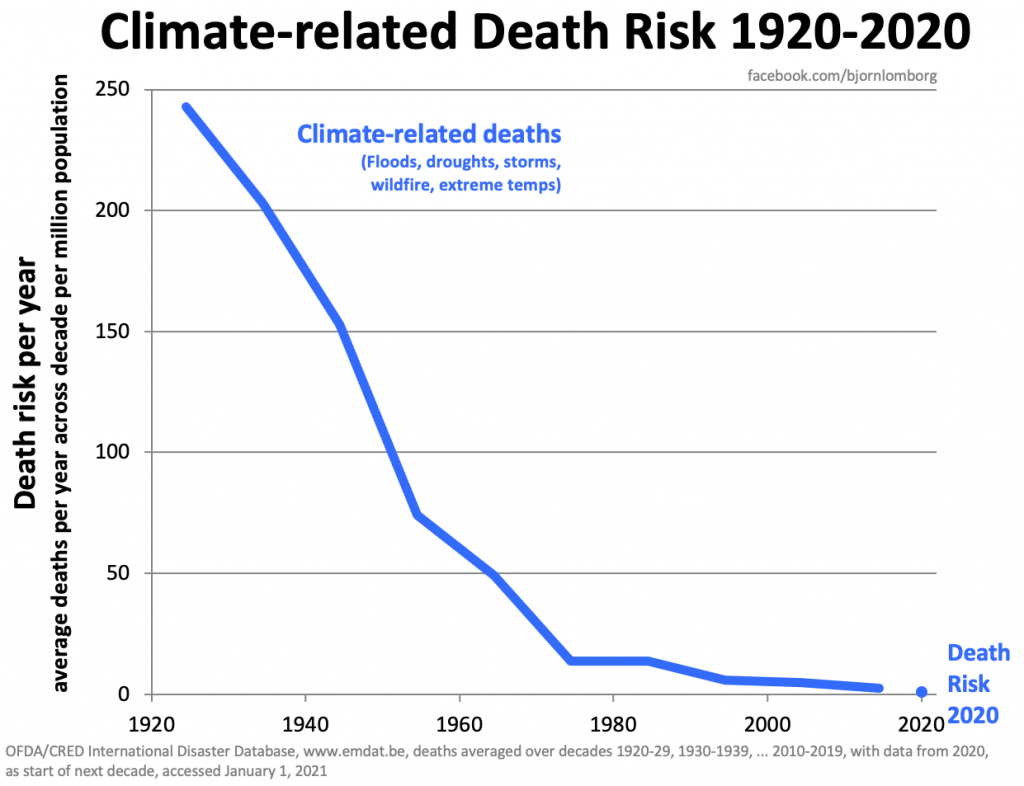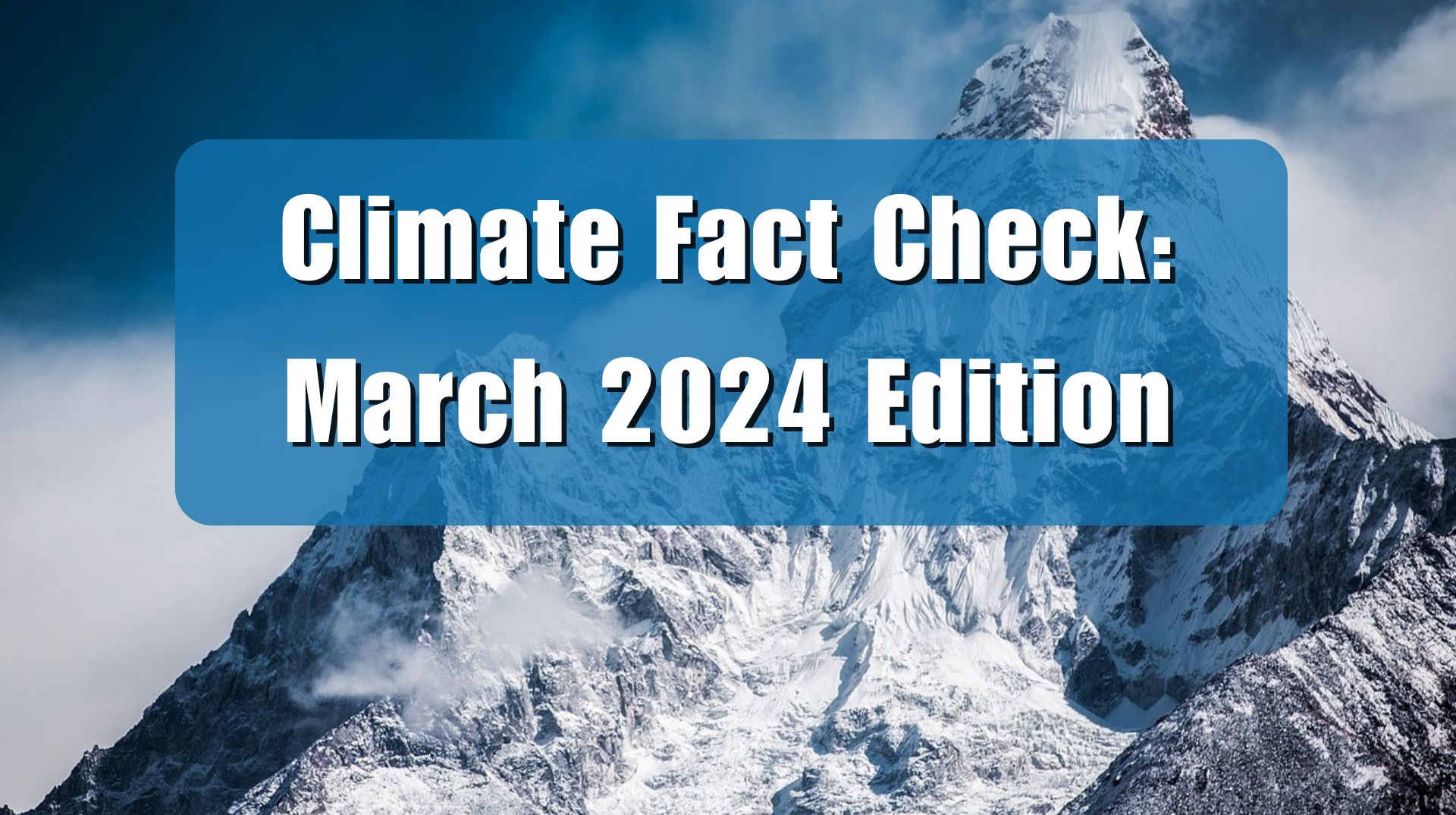New data shows the global climate-related death risk has dropped by over 99% since 1920.
Despite the near constant caterwauling from climate alarmists that we are in a “climate emergency”, real-world data, released at the end of 2020 shows that climate related deaths are now approaching zero. The data spans 100 years of “global warming” back to 1920 and shows “climate related” deaths are now approaching zero.
Below is an update of the graph in the 2020 peer-reviewed article by Bjørn Lomborg: Welfare in the 21st century: Increasing development, reducing inequality, the impact of climate change, and the cost of climate policies

Lomborg posted the updated graph on his Facebook page January 2nd, 2021. Clearly, the risk from climate related disaster has shrunk to nearly nothing.
Lomborg reports:
“Back in the 1920s, the death count from climate-related disasters was 485,000 on average every year. In the last full decade, 2010-2019, the average was 18,357 dead per year or 96% lower. In the first year of the new decade, 2020, the preliminary number of dead was even lower at 8,086 — 98% lower than the 1920s average.
But because the world’s population also quadrupled at the same time, the climate-related *death risk* has dropped even faster. The death risk is the probability of you dying in any one year. In the 1920s, it was 243 out of a million people that would die from climate-related disasters.
In the 2010s, the risk was just 2.5 per million people — a drop of 99%. Now, in 2020, the preliminary number is 1 per million — 99.6% lower.”
This is clearly the opposite of what climate alarmists have been screaming about, but that is because we’re been exposed to a constant stream of “disaster TV” on cable news and Internet news outlets telling us daily about yet another new disaster, which invariably gets blamed on “climate change”.
There’s an important distinction that must be made: increased reports does not equal increased death risk.
While the number of reported events is increasing, that is mainly due to increased reporting. Called “the CNN effect“, we now have 24 hour news, Internet, and people able to make reports of weather disasters from their cellphones, i.e. storm-chasers.
30 years ago, we had none of that, and we weren’t exposed to the constant stream of disaster reporting with the climate blame-game attached.
Despite this good news, it is unlikely to deter climate alarmism, since it has evolved into a belief system, eschewing data and science for “climate justice”.

















[…] Originally published on Climate Realism […]
The climate of our planet has barely changed in the past 100 years, so the change in climate related deaths must have very little to do with climate change.
While climate alarmists are always screaming about something, it is almost always about the future climate. A climate crisis is always coming … but our actual climate keeps getting better. I have been listening to their always wrong predictions of doom since the 1960s. While the decline in climate related deaths is good news, it has almost nothing to do with the climate itself.
The claim that our planet’s climate is getting worse contradicts reality. The climate has been improving for hundreds of years, since the Little Ice Age centuries. I see warmer winter nights in Alaska as good news. The climate alarmists see an “existential” climate crisis.
They also “see” Trump colluding with Russians, Hunter Biden never owned a laptop computer, the 2020 election was honest, and what the United States really needs are de-funding the police, and open borders! Many people live in an “alternate universe” where beliefs trump data — an anti-science universe !
If it has changed at at all, how much of it is attributable, irrefutably, to man’s activity.
The hidden costs of renewable energy are enormous, so we would be well advised to continue to rely on good old fossil fuels. Here in Queensiand, the Indians cannot scoop it out of the ground fast enough!! (Adani)
Just looking at climate metrics’ fluctuations over the past 100 years, I see nothing more than a normal, unremarkable random walk between a couple of standard deviations from the largely unhelpful ‘average’. Nothing to worry about folks. I think people are spooked by the contant reference to ‘average’ in TV weather reports as though this has meaning itself. Long term median would be more helpful, and possibly more relevant. I get the impression that weather measures are on a Cauchy distribution for which there is no average, anyway.
Of course if we no longer have affordable, reliable energy and/or info structure, which is were we may be headed if alarmist get there way, well, you might say that would change everything, but not in a good way.
Look at what graphic you are using. Then correct your article.
There’s no correction needed.